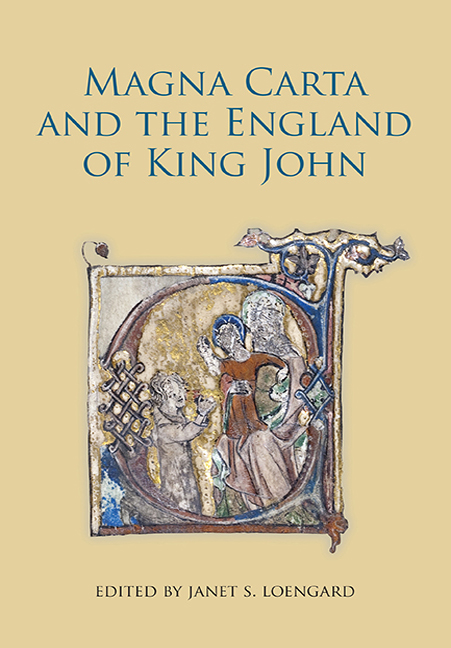Book contents
- Frontmatter
- Contents
- List of Contributors
- List of Abbreviations
- Introduction
- England in 1215: An Authoritarian Angevin Dynasty Facing Multiple Threats
- The Anonymous of Béthune, King John and Magna Carta
- Baronial Paranoia in King John's Reign
- The Forest Eyre in the Reign of King John
- The Managerial Revolution in the English Church
- Magna Carta, the ius commune, and English Common Law
- Justice without Judgment: Criminal Prosecution before Magna Carta
- What Did Magna Carta Mean to Widows?
- The English Economy in the Age of Magna Carta
- The Complaint of King John against William de Briouze (c. September 1210)
- Index
England in 1215: An Authoritarian Angevin Dynasty Facing Multiple Threats
Published online by Cambridge University Press: 28 April 2017
- Frontmatter
- Contents
- List of Contributors
- List of Abbreviations
- Introduction
- England in 1215: An Authoritarian Angevin Dynasty Facing Multiple Threats
- The Anonymous of Béthune, King John and Magna Carta
- Baronial Paranoia in King John's Reign
- The Forest Eyre in the Reign of King John
- The Managerial Revolution in the English Church
- Magna Carta, the ius commune, and English Common Law
- Justice without Judgment: Criminal Prosecution before Magna Carta
- What Did Magna Carta Mean to Widows?
- The English Economy in the Age of Magna Carta
- The Complaint of King John against William de Briouze (c. September 1210)
- Index
Summary
In spring 1215 King John faced a confrontation with his barons that resulted from more than his personal failings, numerous as they were. As J. E. A. Jolliffe wrote a half-century ago, Magna Carta was ‘a judgment, a grand inquest upon the whole past of Angevin kingship’. John faced intractable problems in defending the Angevin ‘empire’ assembled by his father Henry II. Under John, as under his father and his brother Richard I, England with its precocious professionalization or bureaucratization would be the ‘nerve centre’ of their domains. England, together with Normandy to a lesser extent, was the three Angevin monarchs’ primary source of funds, a vast treasure trove for funding military campaigns, fighting off rebellions, and repelling Capetian attacks on their French possessions. Each generation had to make more excessive demands on the English, and John's rule over England differed only in degree from his two predecessors’ authoritarian governance.
Even with the rich English kingdom under firm control, the Angevins found governing an ‘empire’ incorporating both the British Isles and Continental domains covering half of western France an impossible goal, given its size and diversity. By the end of the twelfth century, the French ruler's resources were beginning to match those of Richard Lionheart, threatening his financial advantage. Richard was brutal and unrelenting in his financial exactions on both the English and the Normans, and the combination of ruthless taxation and repeated French invasions was exhausting the Normans, alienating them from their duke. Their indifference would turn into outright hostility in John's early years, causing Norman nobles’ defections to the Capetian king. Under Philip II of France basic changes in the structure of French royal government brought increases in royal revenues, giving him an income close to parity with the Angevin monarchs by the first years of the thirteenth century.
John's revenues were already lagging behind Richard's in the years before his loss of Normandy in 1204, and its loss reduced his resources further. Despite raising enormous sums in the years before his great campaign to recover his lost French lands in 1214, he could not match the Capetian king's growing wealth, which now included Norman revenues. As the nature of Richard's and John's rule increasingly took on a ‘strong military colour’, both engaged in a gigantic shakedown of great landholders to extort money and military service, despite doctrines of royal responsibility for the realm's general welfare.
- Type
- Chapter
- Information
- Magna Carta and the England of King John , pp. 10 - 26Publisher: Boydell & BrewerPrint publication year: 2010



